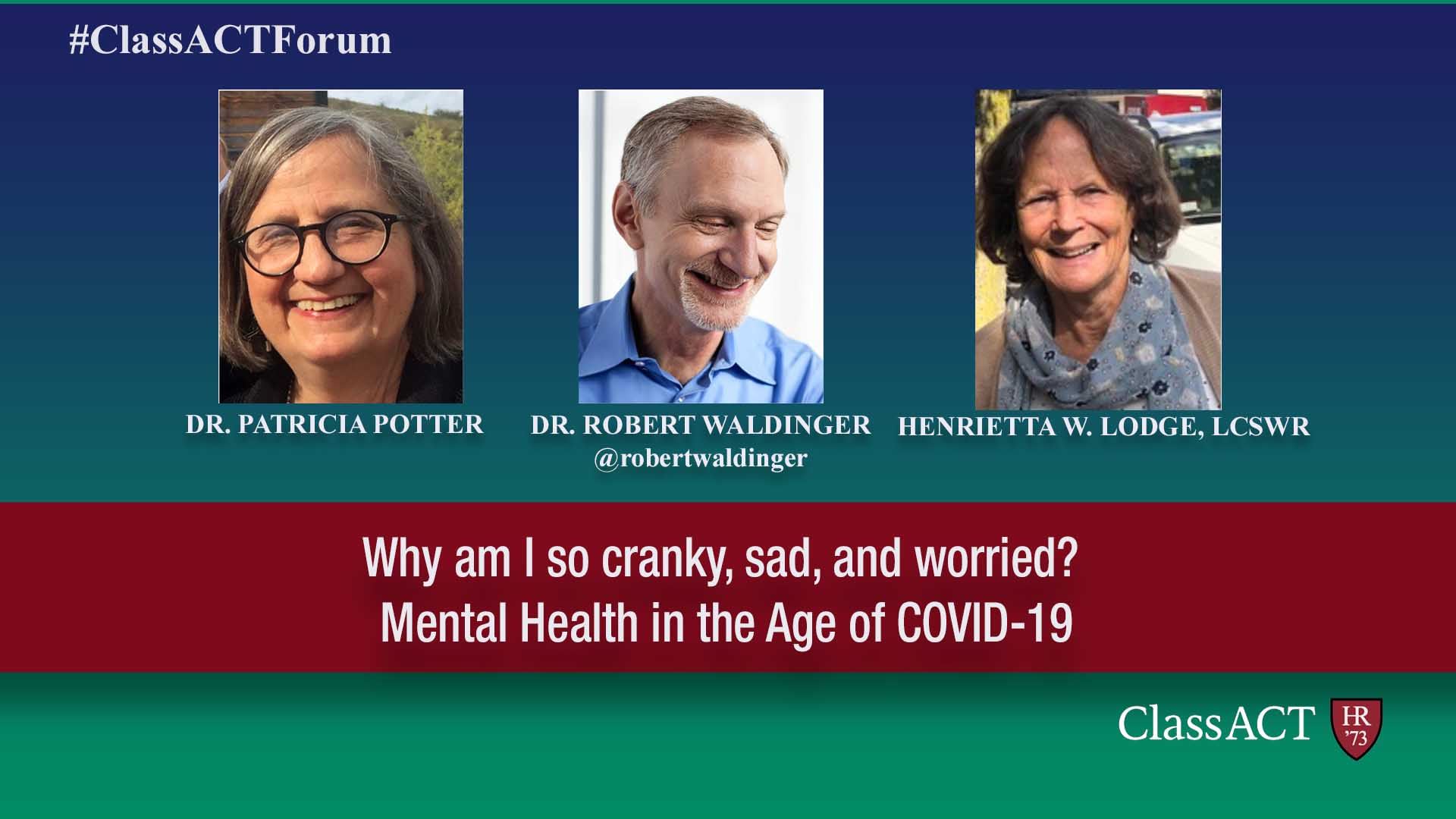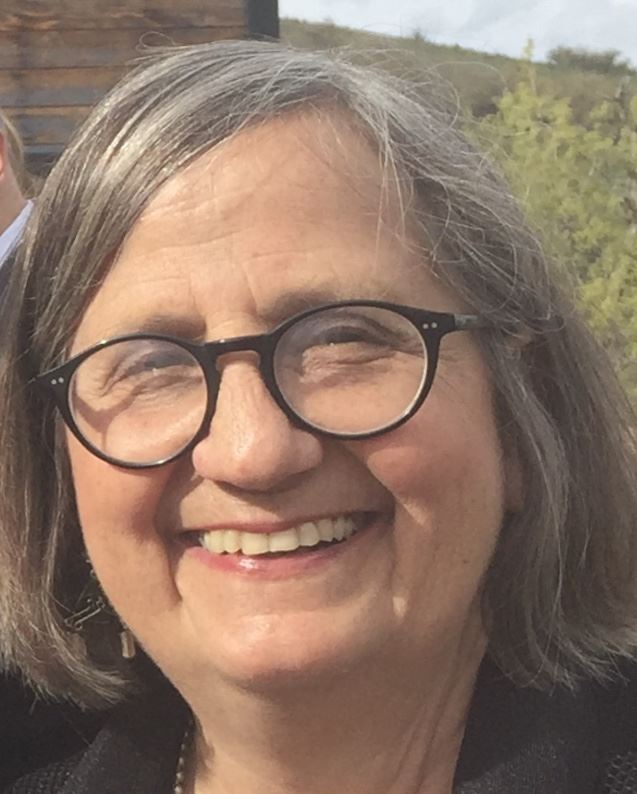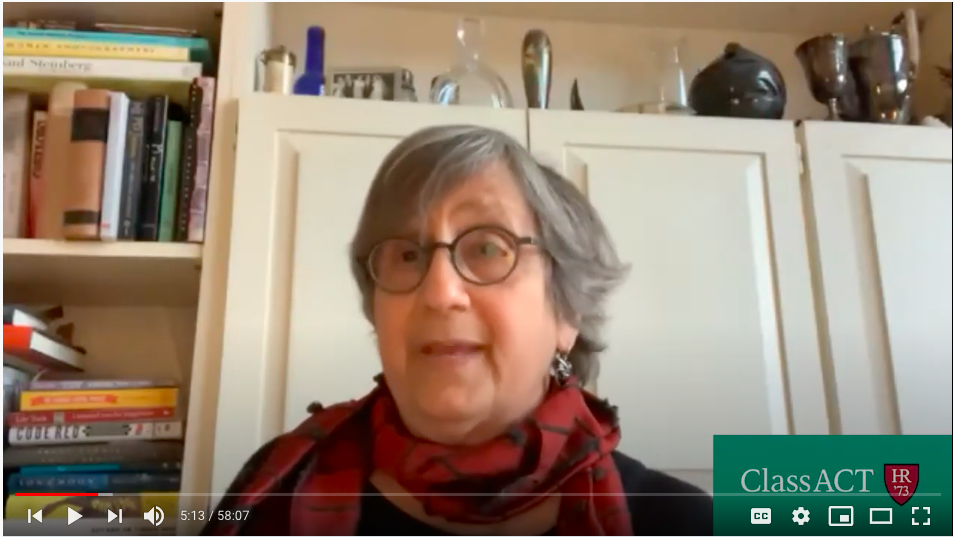- HOME
- Mental Health
WHY AM I SO CRANKY, SAD, AND WORRIED?
MENTAL HEALTH IN THE AGE OF COVID-19
May 7, 2020

This is a question a lot of us are asking ourselves these days! The COVID-19 pandemic is creating personal and emotional challenges for all of us.
For its third ClassACT ZOOM Forum on Thursday, May 7, 2020, ClassACT HR73 assembled a remarkable group of HR73 mental health professionals to share their insights about the effects of the pandemic on our mental health and to provide suggestions for effective coping strategies. They examined the range of reactions to the unprecedented challenges of the illness itself, and its personal and societal consequences for adults and children alike: physical distancing and isolation, financial insecurities, and conflicting medical and political information.
We invite you to listen and learn.
VIDEOS FROM THE CLASSACT ZOOM MENTAL HEALTH PANEL
We have created 5 videos from this forum--one of the whole event, and 4 others, divided by topic. They are all available by clicking on the image of the YouTube video screen below. Then, you can either click "play all" on the left side of your screen and the videos will play in succession, or pick and choose which videos you want to watch, all of which are listed on the right.
OUR PANELISTS
DR. PATRICIA POTTER
 Dr. Patricia Potter is a child, adolescent, and adult psychiatrist, and an adult psychoanalyst. She is on the faculty of the Boston Psychoanalytic Society and Institute and the Massachusetts Institute for Psychoanalysis. She has also been an Instructor in Psychiatry at Harvard Medical School.
Dr. Patricia Potter is a child, adolescent, and adult psychiatrist, and an adult psychoanalyst. She is on the faculty of the Boston Psychoanalytic Society and Institute and the Massachusetts Institute for Psychoanalysis. She has also been an Instructor in Psychiatry at Harvard Medical School.
COPING STRATEGIES
- This goes for adults and kids: you have to accept that you can’t make it all better. You have to accept that this [situation] sucks, and that we can do the kinds of things that make us feel better, but that will not make everything better, and we’re not at fault. We should accept how we feel.
- It’s important to be able to ask for help from friends, family, and professionals.
- Stay in touch with the people you care about.
DR. ROBERT WALDINGER
 Dr. Robert Waldinger is a psychiatrist, psychoanalyst and Zen priest. He is Clinical Professor of Psychiatry at Harvard Medical School and directs the Harvard Study of Adult Development, one of the longest-running studies of adult life ever done. Dr. Waldinger is the author of numerous scientific papers as well as two books. He teaches medical students and psychiatry residents at Massachusetts General Hospital in Boston, and he is a Senior Dharma Teacher in Boundless Way Zen. robertwaldinger.com.
Dr. Robert Waldinger is a psychiatrist, psychoanalyst and Zen priest. He is Clinical Professor of Psychiatry at Harvard Medical School and directs the Harvard Study of Adult Development, one of the longest-running studies of adult life ever done. Dr. Waldinger is the author of numerous scientific papers as well as two books. He teaches medical students and psychiatry residents at Massachusetts General Hospital in Boston, and he is a Senior Dharma Teacher in Boundless Way Zen. robertwaldinger.com.
COPING STRATEGIES
- Self care is surprisingly important. Actually sleeping enough, eating well, getting exercise, and not drinking too much, all of those are important in term of establishing a physiological baseline of wellbeing, which supports emotional well being.
- Pay close attention to what you’re allowing into your mind - too much visual media is designed to agitate us. Read the news, but read it from the most trusted sources, and do not look at screens for two hours before you go to sleep.
- We need to remember to give each other more space than we’re used to. At the same time, reach out to people you may not see on a daily basis, and be more proactive than you would usually be in getting in touch.
HENRIETTA W. LODGE, LCSWR
 Henrietta W. Lodge, LCSWR, is a recently retired school social worker with 40 years’ experience working with both middle and high school students, their families and school staff in public and private schools. She serves on the Putnam/Northern Westchester (NY) Regional Crisis Team and the Putnam County (NY) Suicide Task Force. She is also a member of ClassACT’s Communication Committee.
Henrietta W. Lodge, LCSWR, is a recently retired school social worker with 40 years’ experience working with both middle and high school students, their families and school staff in public and private schools. She serves on the Putnam/Northern Westchester (NY) Regional Crisis Team and the Putnam County (NY) Suicide Task Force. She is also a member of ClassACT’s Communication Committee.
COPING STRATEGIES
- It’s important to remember that kids’ lives are just as stressful as ours, but they don’t have the experience to handle it as well as we do. As parents and grandparents, expect more acting out, melting down, bad behavior, and isolation from kids. Some of it may be a normal reaction, but if you think it isn’t, there are people who can help (visit our resource page to find out more).
- Grandparents, reach out to your grandchildren and ask them how they're doing. Talk to your grandkids about social media use, establish structure and a routine, urge them to get outside.
- Kids love taking action to help, and you can tap into that by writing cards to nursing homes, doing arts and crafts, etc. The action will help the anxiety.



